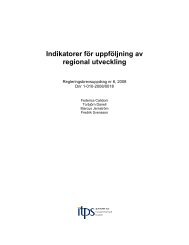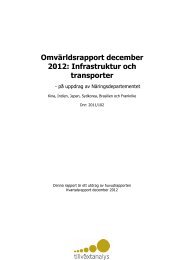- Page 1:
A2006:007The Internationalizationof
- Page 4:
ITPS, Swedish Institute For Growth
- Page 7 and 8:
THE INTERNATIONALIZATION OF CORPORA
- Page 9 and 10:
THE INTERNATIONALIZATION OF CORPORA
- Page 11:
THE INTERNATIONALIZATION OF CORPORA
- Page 14 and 15:
THE INTERNATIONALIZATION OF CORPORA
- Page 16 and 17:
THE INTERNATIONALIZATION OF CORPORA
- Page 18 and 19:
THE INTERNATIONALIZATION OF CORPORA
- Page 20 and 21:
THE INTERNATIONALIZATION OF CORPORA
- Page 22 and 23:
THE INTERNATIONALIZATION OF CORPORA
- Page 24 and 25:
THE INTERNATIONALIZATION OF CORPORA
- Page 29 and 30:
THE INTERNATIONALIZATION OF CORPORA
- Page 31:
THE INTERNATIONALIZATION OF CORPORA
- Page 35 and 36:
THE INTERNATIONALIZATION OF CORPORA
- Page 37 and 38:
THE INTERNATIONALIZATION OF CORPORA
- Page 39 and 40:
THE INTERNATIONALIZATION OF CORPORA
- Page 41 and 42:
THE INTERNATIONALIZATION OF CORPORA
- Page 43 and 44:
THE INTERNATIONALIZATION OF CORPORA
- Page 45 and 46:
THE INTERNATIONALIZATION OF CORPORA
- Page 47 and 48:
THE INTERNATIONALIZATION OF CORPORA
- Page 49 and 50:
THE INTERNATIONALIZATION OF CORPORA
- Page 51 and 52:
THE INTERNATIONALIZATION OF CORPORA
- Page 53 and 54:
THE INTERNATIONALIZATION OF CORPORA
- Page 55 and 56:
THE INTERNATIONALIZATION OF CORPORA
- Page 57 and 58:
THE INTERNATIONALIZATION OF CORPORA
- Page 59 and 60:
THE INTERNATIONALIZATION OF CORPORA
- Page 61 and 62:
THE INTERNATIONALIZATION OF CORPORA
- Page 63 and 64:
THE INTERNATIONALIZATION OF CORPORA
- Page 65 and 66:
THE INTERNATIONALIZATION OF CORPORA
- Page 67 and 68:
THE INTERNATIONALIZATION OF CORPORA
- Page 69 and 70:
THE INTERNATIONALIZATION OF CORPORA
- Page 71 and 72:
THE INTERNATIONALIZATION OF CORPORA
- Page 73 and 74:
THE INTERNATIONALIZATION OF CORPORA
- Page 75 and 76:
THE INTERNATIONALIZATION OF CORPORA
- Page 77 and 78:
THE INTERNATIONALIZATION OF CORPORA
- Page 79 and 80: THE INTERNATIONALIZATION OF CORPORA
- Page 81 and 82: THE INTERNATIONALIZATION OF CORPORA
- Page 83 and 84: THE INTERNATIONALIZATION OF CORPORA
- Page 85 and 86: THE INTERNATIONALIZATION OF CORPORA
- Page 87 and 88: THE INTERNATIONALIZATION OF CORPORA
- Page 89 and 90: THE INTERNATIONALIZATION OF CORPORA
- Page 91 and 92: THE INTERNATIONALIZATION OF CORPORA
- Page 93 and 94: THE INTERNATIONALIZATION OF CORPORA
- Page 95 and 96: THE INTERNATIONALIZATION OF CORPORA
- Page 97 and 98: THE INTERNATIONALIZATION OF CORPORA
- Page 99 and 100: THE INTERNATIONALIZATION OF CORPORA
- Page 101 and 102: THE INTERNATIONALIZATION OF CORPORA
- Page 103 and 104: THE INTERNATIONALIZATION OF CORPORA
- Page 105 and 106: THE INTERNATIONALIZATION OF CORPORA
- Page 107 and 108: THE INTERNATIONALIZATION OF CORPORA
- Page 109 and 110: THE INTERNATIONALIZATION OF CORPORA
- Page 111 and 112: THE INTERNATIONALIZATION OF CORPORA
- Page 113 and 114: THE INTERNATIONALIZATION OF CORPORA
- Page 115 and 116: THE INTERNATIONALIZATION OF CORPORA
- Page 117 and 118: THE INTERNATIONALIZATION OF CORPORA
- Page 119 and 120: THE INTERNATIONALIZATION OF CORPORA
- Page 121 and 122: THE INTERNATIONALIZATION OF CORPORA
- Page 123 and 124: THE INTERNATIONALIZATION OF CORPORA
- Page 125 and 126: THE INTERNATIONALIZATION OF CORPORA
- Page 127 and 128: THE INTERNATIONALIZATION OF CORPORA
- Page 129: THE INTERNATIONALIZATION OF CORPORA
- Page 133 and 134: THE INTERNATIONALIZATION OF CORPORA
- Page 135 and 136: THE INTERNATIONALIZATION OF CORPORA
- Page 137 and 138: THE INTERNATIONALIZATION OF CORPORA
- Page 139 and 140: THE INTERNATIONALIZATION OF CORPORA
- Page 141 and 142: THE INTERNATIONALIZATION OF CORPORA
- Page 143 and 144: THE INTERNATIONALIZATION OF CORPORA
- Page 145 and 146: THE INTERNATIONALIZATION OF CORPORA
- Page 147 and 148: THE INTERNATIONALIZATION OF CORPORA
- Page 149 and 150: THE INTERNATIONALIZATION OF CORPORA
- Page 151 and 152: THE INTERNATIONALIZATION OF CORPORA
- Page 153 and 154: THE INTERNATIONALIZATION OF CORPORA
- Page 155 and 156: THE INTERNATIONALIZATION OF CORPORA
- Page 157 and 158: THE INTERNATIONALIZATION OF CORPORA
- Page 159 and 160: THE INTERNATIONALIZATION OF CORPORA
- Page 161 and 162: THE INTERNATIONALIZATION OF CORPORA
- Page 163 and 164: THE INTERNATIONALIZATION OF CORPORA
- Page 165 and 166: THE INTERNATIONALIZATION OF CORPORA
- Page 167 and 168: THE INTERNATIONALIZATION OF CORPORA
- Page 169 and 170: THE INTERNATIONALIZATION OF CORPORA
- Page 171 and 172: THE INTERNATIONALIZATION OF CORPORA
- Page 173 and 174: THE INTERNATIONALIZATION OF CORPORA
- Page 175 and 176: THE INTERNATIONALIZATION OF CORPORA
- Page 177 and 178: THE INTERNATIONALIZATION OF CORPORA
- Page 179 and 180: THE INTERNATIONALIZATION OF CORPORA
- Page 181 and 182:
THE INTERNATIONALIZATION OF CORPORA
- Page 183 and 184:
THE INTERNATIONALIZATION OF CORPORA
- Page 185 and 186:
THE INTERNATIONALIZATION OF CORPORA
- Page 187 and 188:
THE INTERNATIONALIZATION OF CORPORA
- Page 189 and 190:
THE INTERNATIONALIZATION OF CORPORA
- Page 191 and 192:
THE INTERNATIONALIZATION OF CORPORA
- Page 193 and 194:
THE INTERNATIONALIZATION OF CORPORA
- Page 195 and 196:
THE INTERNATIONALIZATION OF CORPORA
- Page 197 and 198:
THE INTERNATIONALIZATION OF CORPORA
- Page 199 and 200:
THE INTERNATIONALIZATION OF CORPORA
- Page 201 and 202:
THE INTERNATIONALIZATION OF CORPORA
- Page 203 and 204:
THE INTERNATIONALIZATION OF CORPORA
- Page 205 and 206:
THE INTERNATIONALIZATION OF CORPORA
- Page 207 and 208:
THE INTERNATIONALIZATION OF CORPORA
- Page 209 and 210:
THE INTERNATIONALIZATION OF CORPORA
- Page 211 and 212:
THE INTERNATIONALIZATION OF CORPORA
- Page 213 and 214:
THE INTERNATIONALIZATION OF CORPORA
- Page 215 and 216:
THE INTERNATIONALIZATION OF CORPORA
- Page 217 and 218:
THE INTERNATIONALIZATION OF CORPORA
- Page 219 and 220:
THE INTERNATIONALIZATION OF CORPORA
- Page 221 and 222:
THE INTERNATIONALIZATION OF CORPORA
- Page 223 and 224:
THE INTERNATIONALIZATION OF CORPORA
- Page 225 and 226:
THE INTERNATIONALIZATION OF CORPORA
- Page 227 and 228:
THE INTERNATIONALIZATION OF CORPORA
- Page 229 and 230:
THE INTERNATIONALIZATION OF CORPORA
- Page 231 and 232:
THE INTERNATIONALIZATION OF CORPORA
- Page 233 and 234:
THE INTERNATIONALIZATION OF CORPORA
- Page 235 and 236:
THE INTERNATIONALIZATION OF CORPORA
- Page 237 and 238:
THE INTERNATIONALIZATION OF CORPORA
- Page 239 and 240:
THE INTERNATIONALIZATION OF CORPORA
- Page 241 and 242:
THE INTERNATIONALIZATION OF CORPORA
- Page 243 and 244:
THE INTERNATIONALIZATION OF CORPORA
- Page 245 and 246:
THE INTERNATIONALIZATION OF CORPORA
- Page 247 and 248:
THE INTERNATIONALIZATION OF CORPORA
- Page 249 and 250:
THE INTERNATIONALIZATION OF CORPORA
- Page 251 and 252:
THE INTERNATIONALIZATION OF CORPORA
- Page 253 and 254:
THE INTERNATIONALIZATION OF CORPORA
- Page 255 and 256:
THE INTERNATIONALIZATION OF CORPORA
- Page 257 and 258:
THE INTERNATIONALIZATION OF CORPORA
- Page 259 and 260:
THE INTERNATIONALIZATION OF CORPORA
- Page 261 and 262:
THE INTERNATIONALIZATION OF CORPORA
- Page 263 and 264:
THE INTERNATIONALIZATION OF CORPORA
- Page 265 and 266:
THE INTERNATIONALIZATION OF CORPORA
- Page 267 and 268:
THE INTERNATIONALIZATION OF CORPORA
- Page 269 and 270:
THE INTERNATIONALIZATION OF CORPORA
- Page 271 and 272:
THE INTERNATIONALIZATION OF CORPORA
- Page 273 and 274:
THE INTERNATIONALIZATION OF CORPORA
- Page 275 and 276:
THE INTERNATIONALIZATION OF CORPORA
- Page 277 and 278:
THE INTERNATIONALIZATION OF CORPORA
- Page 279 and 280:
THE INTERNATIONALIZATION OF CORPORA
- Page 281 and 282:
THE INTERNATIONALIZATION OF CORPORA
- Page 283 and 284:
THE INTERNATIONALIZATION OF CORPORA
- Page 285 and 286:
THE INTERNATIONALIZATION OF CORPORA
- Page 287 and 288:
THE INTERNATIONALIZATION OF CORPORA
- Page 289 and 290:
THE INTERNATIONALIZATION OF CORPORA
- Page 291 and 292:
THE INTERNATIONALIZATION OF CORPORA
- Page 293 and 294:
THE INTERNATIONALIZATION OF CORPORA
- Page 295 and 296:
THE INTERNATIONALIZATION OF CORPORA
- Page 297 and 298:
THE INTERNATIONALIZATION OF CORPORA
- Page 299 and 300:
THE INTERNATIONALIZATION OF CORPORA
- Page 301 and 302:
THE INTERNATIONALIZATION OF CORPORA
- Page 303 and 304:
THE INTERNATIONALIZATION OF CORPORA
- Page 305 and 306:
THE INTERNATIONALIZATION OF CORPORA
- Page 307 and 308:
THE INTERNATIONALIZATION OF CORPORA
- Page 309 and 310:
THE INTERNATIONALIZATION OF CORPORA
- Page 311 and 312:
THE INTERNATIONALIZATION OF CORPORA
- Page 313 and 314:
THE INTERNATIONALIZATION OF CORPORA
- Page 315 and 316:
THE INTERNATIONALIZATION OF CORPORA
- Page 317 and 318:
THE INTERNATIONALIZATION OF CORPORA
- Page 319 and 320:
THE INTERNATIONALIZATION OF CORPORA
- Page 321 and 322:
THE INTERNATIONALIZATION OF CORPORA
- Page 323 and 324:
THE INTERNATIONALIZATION OF CORPORA
- Page 325 and 326:
THE INTERNATIONALIZATION OF CORPORA
- Page 327:
The Swedish Institute for Growth Po
















